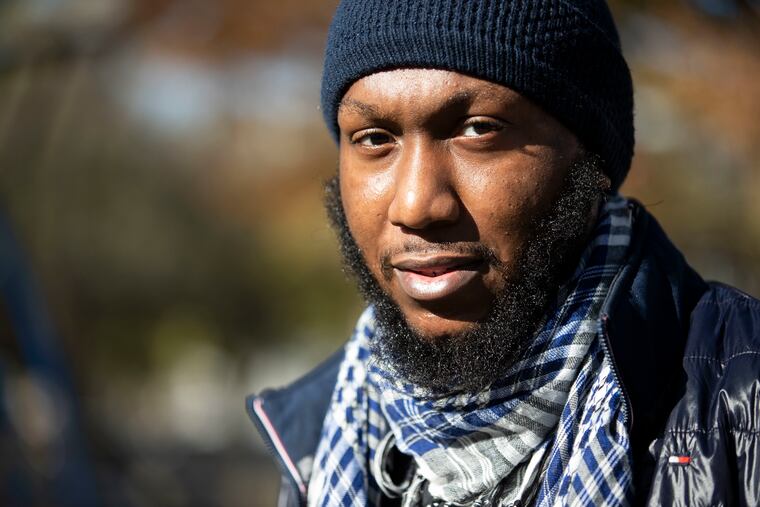His life was once dominated by bullets. Now, he’s helping young people heal in a city drowning in violence | Mike Newall
We won’t be able to make a dent in this epidemic of trauma and violence until we start listening to the people who have lived through it.

When I first met Mahquill Sims this summer, the nightmares were still keeping him awake. He would wake up sweating, trying to escape dreams of the bullet that tore through his lung in January.
Most nights, after the dreams, no more sleep would come.
The 29-year-old South Philadelphian had put down his own gun only a few months before — and with it, his thirst for revenge.
For a few years, his life had been dominated by bullets.
First in 2016, when Sims’ brother fell into a shooting war over a stare. One leveled at a man outside a South Philly corner store, and deemed threatening enough that it led to bullets. That year, Sims carried a gun for protection.
Then in 2017, another brother was killed in an entirely different fight, by a bullet meant for someone else. That’s how it sometimes goes in Philly.
Now Sims carried a gun, because he was desperate for revenge.
Two years later, he was shot at the end of a brawl he was trying to break up in North Philly. The bullet collapsed his lung and left him alone in a hospital room, with nothing but those nightmares and rage, until an outreach worker knocked on the door and offered him a chance.
I thought about Sims this week after writing about the harsh reality dealt to so many men of color in Philly. How black men in our city die younger, and more violently, or succumb to stress and poor health care. How so many are locked up or dead that there’s a 90,000-person gap between men and women in Philly.
It’s a problem that seems almost intractable. And then you remember someone like Mahquill Sims — and the hope he represents.
Sims is a member of the “Game Changers,” a group of young black and Hispanic men who have suffered trauma — shootings, stabbings, beatings, drug addiction, or simply the unrelenting stress of growing up in neighborhoods where all of that is commonplace — and have trained to fight it, learning how to recognize and treat trauma in others.
» READ MORE: The Game Changers, a group of young trauma survivors, heal themselves to help others | Mike Newall
The celebrated program is called the Community Health Worker Peer Project and operates out of Drexel University’s Center for Nonviolence and Social Justice. Every class gives itself a name. The one before the “Game Changers” was called “the Healers.” The program is adding to the ranks of workers who can treat our city’s many traumatized communities, putting young men of color on the front lines of an epidemic where their voices are so desperately needed.
» READ MORE: These healers want to ensure trauma victims aren’t treated like ‘just another black kid in a hospital’ | Mike Newall
We won’t be able to make a dent in this epidemic of trauma and violence until we start listening to the people who have lived through it — empowering them to help fix it.
That’s what the Game Changers do now. Seven of the 11 members of their cohort, who graduated this summer, are now working in the social services, as community health workers and peer advocates. It’s the most meaningful work.
“Every day I leave work, I have a smile on my face — it’s pure happiness,” said Nasir Lee, a Game Changer and a community health worker who works with people struggling with mental illness and homelessness. “I don’t know how many 20-year-olds you know who are happy to go to work every day, but I am one of them.”
This, from a former street brawler who was once so guarded that a single smile from him was a revelation.
There’s Waltkeem Jenkins, who works with kids at St. Christopher’s Hospital for Children as part of the Healing Hurt People program. He grew up in South Philly, at 26th and Tasker, enduring a childhood that would shock an outsider but is so typical for so many of Philadelphia’s children. Though he never ran with a gang, he’s been jumped, assaulted, shot at. Once, when he was 14, a sore loser of a basketball game opened fire on him and his friends. His depression became so acute that he contemplated suicide.
Now, the sweet, sensitive 22-year-old knocks on hospital room doors at St. Chris’, and tells the wounded children inside that he’s here to listen.
“Each time I come into these hospital doors,” he says, “there’s someone here that needs me.”
And there’s Sims, who’s a youth support partner at Resources for Human Development. His job is to meet with troubled young people from all over the city and help them plan a future: jobs, college, money management. It was one he could hardly see for himself not even a year ago.
On Thursday, we drove around his old South Philly neighborhood, near 24th and Wharton, past the corner where Sims used to sell drugs, and the park he could not cross for fear of being shot. A police cruiser marked the spot where a man was recently killed.
“For a young black guy to be on the front lines — it’s absolutely important,” he said. “Because the kids need to hear it from someone that’s been where they’re from.”
He still has nightmares sometimes. But these days, they don’t keep him up.